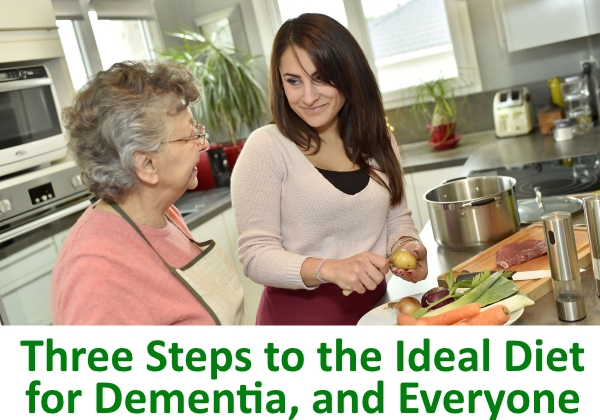Contributing Writer: Patty Hopker, author

One of the most difficult parts about being a caregiver is tending to the nutritional needs of someone with Alzheimer’s or another dementia.
It’s impossible to spend all day in the kitchen or extended time grocery shopping, so your plan must be simple, scientifically effective, and routine in it’s execution.
Overcoming dementia nutritionally actually begins as an infant and continues with lifelong healthy eating patterns that provide the brain with maximum nutritional safeguards.
However, with the decline of brain functioning already at hand, the correct combinations of nutrients will need to work overtime to repair, or at least maintain status quo of the present damage.
The Dietary Studies:
Let’s begin with some basic research that will lay the groundwork for our decision making in creating menu plans. The major scientific research into the nutritional needs of individuals with Alzheimer’s has included a combination of two major diets.
The Mediterranean Diet, which is a very healthy sustainable way of eating using high quality meats, vegetables, and oils, is the first diet.
The second diet is a low-salt, plant-focused DASH diet that was created by physicians for the heart health of their patients.
A 5 year study bringing these two highly acclaimed diets merged into one diet had a significant effect on the test subjects. The study showed that the risk of Alzheimer’s dementia could be reduced by up to 53%. (Alzheimers Dement.2015 Sep; 11[9]:1007-14)
The bringing together of these two diets created what is now known as the MIND diet or, the Mediterranean-Dash Intervention for Neurodegenerative Delay diet. (Now that’s a mouthful!)
The studies didn’t end there, but the research was expanded by having test patients consume even higher ratios of healthy oils including olive oil, coconut oil, avocado, butter, cream, eggs, nuts, etc.
Carbohydrates were also drastically reduced which allowed the body to remain in a state of ketosis. Amazingly enough, the Alzheimer’s dementia condition was drastically improved – sometimes by 3 or 4 points over a 3 month period.
You read that right, people’s mental status improved! The initial MIND diet itself was broken down into ratios of: 38% carbohydrate, 33% fat and 26% protein.
The concluding significant diet was very similar to what is known as the Keto diet and had different ratios of: 10% carbohydrate, 70% fat and 20% protein.
Now you’re probably thinking this is way too complicated and too much work and a waste of your valuable time, but let me explain how it can all fit together and possibly improve the life of the person for whom you are providing care.
Meal Planning in 3 Easy Steps:
Step 1: Choose your protein for the day. Any fish, meat, nuts and/or eggs that are appealing to you. Beans, because of their high carbohydrate ratio, are not highly recommended unless of course you follow a vegetarian lifestyle.
Step 2: Add your vegetables–salads, raw veggies, cooked veggies as much as you want.
Step 3: Then the real fun part is adding the fat. Butter, coconut oil, olive oil, avocado, sunseed oil, almond oil, mayonnaise with olive oil or avocado oil – it’s all good.
Add a couple tablespoons of coconut oil or olive oil to those steamed vegetables along with some fun herbs, or add some avocado to the tuna salad.
For an added treat, add some blueberries or blackberries with some thick creamy plain greek yogurt.
These dietary recommendations are not being presented as a cure by any means, but there have been documented cases of mental improvement in the test subjects.
It’s heartwarming to think there may be some hope.
If you’re like me, I will try anything to improve the quality of life for anyone – even if it’s just a small improvement. It’s worth the effort to be sure and, who knows, you may be pleasantly surprised :).
 About the Author: Patty Hopker is the author of Senior Satisfaction Revealed: Three Steps for a Secure and Fulfilling Life and a coach for Seniors and their Care Providers.
About the Author: Patty Hopker is the author of Senior Satisfaction Revealed: Three Steps for a Secure and Fulfilling Life and a coach for Seniors and their Care Providers.
When decisions are difficult and problems are overwhelming, Patty can assist by creating a step-by-step action plan which will guide you through the most difficult times.
Contact Patty through her website at seniorsatisfactionrevealed.com for a complimentary strategy session resourcing over 20 years experience she has had successfully helping others.
If you like what you’ve read, why not receive periodic updates when you:
Subscribe to the TinT Newsletter
Do you want to share any nutrition advive or do you have a question? I’d love to hear from you in the comments below:





Leave a Reply